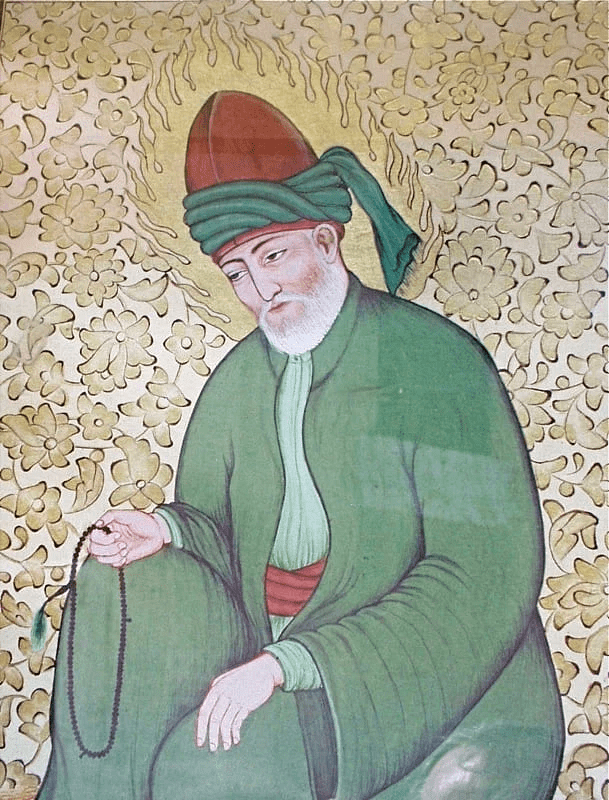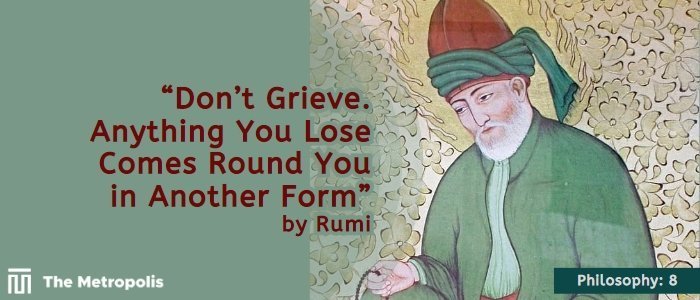Hasan Mahmud –
Jalal ad-Din Muhammad Rumi, popularly known as Rumi, was a Persian poet, theologian, scholar, and Sufi mystic who lived in the 13th century. His writings have a significant influence on both literature and spirituality. Rumi’s poetry frequently discusses love, spirituality, and the pursuit of life’s meaning. His writings continue to inspire and enthrall readers today despite the passage of time and regional boundaries.
One of his most famous quotes is “Don’t grieve. Anything you lose comes round in another form”. In times of loss and transition, it has long encouraged people to find hope.

The quote has numerous possible meanings, but its main message is that everything in life is transient. Rumi is reminding us that nothing lasts forever, including our physical bodies, relationships, and possessions. He does, however, make the argument that life has a cyclical aspect and that whatever we lose eventually gives way to something new.
This quote emphasizes the transience of existence and the certainty of change. The loss of loved ones, the loss of relationships, the loss of goods, the loss of chances, and even the loss of ourselves are all types of loss that we encounter in life. It is common to experience grief and sadness in response to a loss since it can be unpleasant and difficult to bear. Rumi’s remarks serve as a reminder that nothing is truly gone for good.
We should have confidence that what we have lost will return to us in another form rather than clinging to what we have lost and lingering on our sadness. This suggests that the cosmos has a means of balancing things out rather than that we will always regain exactly what we have lost.
For instance, if we go through a broken relationship, we could make new acquaintances or discover more inner peace and contentment. If we lose our jobs, we might find other employment opportunities or acquire useful skills that we can use in other aspects of our lives. If we lose a loved one, we may find comfort and strength in our memories of them and the connections, we still have with others.
Rumi’s words imply that our losses have a deeper significance and reason. They are part of a bigger, interrelated whole rather than being meaningless or arbitrary. Our losses can help us learn important lessons and advance as people. They can also help us feel empathy and sympathy for those who have gone through similar losses and link us with them.
This remark can be a source of solace for people who have suffered loss, whether it was due to the death of a loved one, a breakup, or another significant life change. It serves as a reminder that although the grief of loss may be severe, it is not unavoidable. New possibilities and experiences will present themselves as life goes on.
Rumi’s quote also refers to metamorphosis. We are frequently compelled to face our weaknesses and limitations when we endure loss. Although going through this process may be difficult, it also presents a chance for development and self-awareness. We make room in our life for something new to appear by letting go of what we have lost. This could take the form of new employment, relationship, or sense of purpose.
Rumi’s quote is rooted in the Sufi tradition, which emphasizes the importance of detachment from material possessions and the impermanence of all things in the world. Sufis hold that everything in the cosmos is interconnected and that the disappearance of one item makes room for the emergence of another. Sufis can achieve peace and satisfaction in the face of hardship by adopting this viewpoint because they understand that everything happens for a reason and that every experience is part of a bigger spiritual journey.
Rumi’s statement, according to some detractors, might be read as a defense of complacency and resignation in the face of injustice and misery. They contend that if we view loss as an unavoidable aspect of life, we run the risk of losing empathy for the plight of others and failing to take effective action to solve systemic issues.
It is crucial to remember that Rumi’s message does not encourage passivity or indifference. Instead, it is an exhortation to hold onto perspective and optimism despite hardship. We may prevent being overtaken by our emotions and instead concentrate on discovering new chances and experiences by understanding that everything in life is transient and that loss is a normal aspect of the human experience.
Furthermore, Rumi’s lesson is not meant to be used in every circumstance. Recognizing that certain losses are more substantial and challenging to recover from than others is crucial. It may be vital to seek professional assistance or support from loved ones in situations of extreme loss and grief to recover and go on.
Rumi’s quotation refers to transformation and rejuvenation on a deeper level. It implies that what we lose might undergo a complete transformation rather than just being replaced by something new. This topic is frequently discussed about spiritual and philosophical ideas, such as the Buddhist and Hindu notions of reincarnation.
In the book “The Alchemist” by Paulo Coelho, the protagonist Santiago sets out on a journey to find his legend or his purpose in life. He discovers along the road that everything in the cosmos is interconnected and that every experience, whether good or bad, has meaning and shapes who we are. Rumi’s quote illustrates this principle by stating that even if we might lose something, that loss might ultimately lead us to something greater.
Last but not least, Rumi’s quotation can be interpreted as an exhortation to accept change and live in the present. It serves as a gentle reminder that nothing lasts forever and that we should not hold on too closely to our goods, connections, or identities. Instead, we ought to be receptive to fresh perspectives and ready to let go of things that are no longer helpful.




